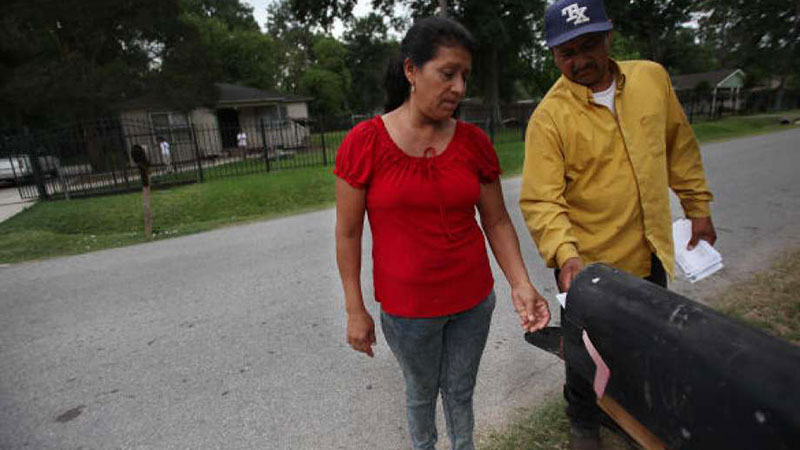story by Lise Olsen, Staff Writer
Houston Chronicle
click here for original article
Wendy Johnson had stopped to check on her deceased parents' empty two-bedroom house when she spotted the absurd: A "For Sale" sign on the lawn.
Johnson, sole heir of her parents' former home of 50 years, hadn't authorized any sale. The next time she visited, the locks had been changed. And a stranger claimed the house was his. He'd paid for it and had the legal papers to prove it.
But the deed turned out to be a forgery, the handiwork of a daring group of rogue businessmen and con artists who claimed ownership of more than 70 vacant houses and lots across Houston and allegedly made millions by reselling them to unwitting buyers, a Houston Chronicle analysis of pending civil and criminal lawsuits shows.
For at least six years, players in a massive swindle boldly entered the Harris County Civil Courthouse with fake deeds bearing the freshly minted signatures of long dead men, faked notaries' seals and other blatantly false claims to seize and sell others' property.
The consequences of the widespread deed fraud — carried out between 2002 and 2008 — continue to affect hundreds of people in some of the city's humblest neighborhoods. Much of the mess remains unresolved.
Yet, for executing what authorities call the largest deed scam in Harris County history, just one man has been criminally convicted for his small role in the fraud, records reviewed by the Chronicle show.
About $6 million in court-ordered penalties against other major players have gone unpaid, despite three years of civil litigation by the Texas Attorney General's office.
One Houston woman, Katherine Williams, whose complaint about the fraud prompted the lawsuit, did get her house back in a related ruling just two weeks ago.
Others have not. Johnson has yet to recover her family home.
"It's a mess," said Nick Abaza, an attorney representing one of many victims. "Trying to find out who's responsible - who's real and who's fictitious - has been a challenge. … I think most of the houses are still in limbo. The supposed buyers have bad titles and the heirs, often a distant or absent relative, are either unaware or unable to resolve the problems."
Valerie Turner, a chief prosecutor in the Harris County District Attorney's Consumer Protection office, has been flooded with complaints about this scam and similar property theft rings whose members tend to hide crimes behind facades of fake names, fraudulent documents and fictitious companies.
'Devastating to families'
"All they care about is creating some chain of title, and it's very rare that they only steal one house. They will take multiple houses," Turner said. The results "can be devastating to families."
A 3-year-old civil fraud case by the Texas Attorney General originally targeted 11 people, including two ex-convicts described as cousins, as well as a string of alleged accomplices and their companies. Participants included friends, family, notaries, a "pill-mill" doctor and flunkies just released from the state penitentiary, public records show.
Matthew Wade, a 44-year-old convicted car thief, former private school counselor and ex-owner of a used car lot, has been accused as a major player along with his cousin Calvin Remo, 45, records show. Remo is wanted on theft charges pending since 2008; Wade was never criminally charged in the case. Both apparently skipped town.
The two, and others, are accused of targeting abandoned or vacant houses in mostly traditionally African-American neighborhoods, including Scenic Woods, North Main, Third Ward and Sunnyside.
Some properties were windowless shacks inhabited by rats or used as crack houses. Others remained filled with furniture and keepsakes left behind by mostly elderly occupants who had died or moved to a nursing home or elsewhere.
Couple paid cash
After obtaining fake - though officially filed - deeds, various ring members changed locks on houses and posted standard "For Sale" signs to attract vulnerable, often cash-paying Hispanic buyers, like Santiago and Eleuteria Flores.
The Houston couple paid $10,000 cash in December 2003 for what looked like an authentic deed. They invested another $30,000 in supplies and sweat equity improving a long-vacant house only to learn that it had never been theirs, court records show.
"We worked so hard," Eleuteria Flores said. "We spent every night after my husband got off work at that house for seven months. After we lost it, I got very sick. From depression."
The true owner, whose elderly mother had moved to a nursing home, claimed he'd also been conned by culprits who allegedly forged his name on a deed.
Dozens of faux deeds have been voided as a result of the AG's civil suit. But many properties associated with the scam still have clouded titles and unresolved ownership issues. Some houses are still occupied by would-be buyers, despite lawsuits filed by often equally poor ripped-off owners or heirs. In other cases, duped sellers got evicted and lost all investments.
To further muddy the trail of fraudulent transactions, the ring used a string of real and fake people and business aliases.
They also took advantage of lax property laws. In Texas, anyone can file a property transfer record or ownership claim without providing ID or other proof. That lack of safeguards further confounds efforts to fight fraud. Harris County Clerk's officials say they haven't time or expertise to verify documents.
Scam dates to '03
In one case, a ring member met buyers right in the county clerk's office where he boldly collected $5,000 cash, signed a receipt and handed them what seemed like a real deed. Instead, it was a freshly filed forgery, complaints allege.
The deed fraud first got reported to police and prosecutors in 2003. But it wasn't until 2008 that the Texas Attorney General's office in Houston identified the scam as one of the largest property frauds in state history and filed a civil suit. Even then, investigators did not realize its ambitious scope - initially finding 40 of more than 70 properties affected.
State Attorney General Greg Abbott promised in 2008 to "hold these defendants accountable and continue working to protect Texas homeowners." And the AG's 2008 civil case is ongoing. Some defendants were dropped. Four have been ordered not to participate in real estate deals or spend the ill-gotten gains. Another awaits trial.
In July 2009, Wade and Remo were ordered by Harris County Civil Judge Kyle Carter to pay a total of $6 million in related civil penalties and $1 million in restitution for violations of the Texas Deceptive Trade Practices Act.
In response to an influx of complaints, the Harris County District Attorney's office filed criminal charges in April 2008 and again in December 2010 against yet another ex-convict linked to the deed scam: Herther Solomon, 35. Solomon was convicted of stealing just one house and sentenced to four years in 2009. But Solomon got released from prison early.
In December 2010, he was brought back to Harris County to face additional charges related to six more house thefts.
He posted a $100,000 bond and was released. His court-appointed defense attorney, Joe Owmby, said Solomon will contest the new charges.
Others initially accused in the AG's civil suit claimed innocence or ignorance. One, Callie Herpin, is a former physician later convicted of prescription drug dealing and federal fraud charges. She remains in prison.
Some not compensated
Another was an "errand boy" who grew up stealing cars with Wade. Ex-con James Lanier King said that he was fresh from the state penitentiary when Wade duped him into setting up a fake property company that operated out of a P.O. Box in Humble. King described Wade as "a very intelligent dude. ... He's a guy that uses trickeration (sic)," according to a deposition provided by Bade Lawal, one property owner's attorney.
Several victims who could receive compensation say they never recovered a cent, though Wade still owns a fleet of cars, including 1960s mint condition Chevy classics, as well as commercial and residential real estate in Harris County, according to property records.
Lillian Satterfield, a Houstonian in her 70s, had only recently become a widow when she learned that a stranger had falsified her late husband's signature on a deed filed after his death in a seemingly blatant attempt to steal her house. Satterfield and her son immediately protested and found free legal help.
But Satterfield remains stuck in court and in negotiations with the buyer - who also claims to have been duped, according to Satterfield's attorney Patricia Tsai, of the nonprofit Lone Star Legal Aid.
Until recently, the widow was sharing a rental house with her son. Then he was evicted after losing his job.
So far, she has been unable to return to the house she owns.

